Ep. 38 - Awakening from the Meaning Crisis - Agape and 4E Cognitive Science
(Sectioning and transcripts made by MeaningCrisis.co)
A Kind Donation
Transcript
Welcome back to Awakening from the Meaning Crisis.
So last time we were taking a look at the perennial problems that are endemic to us, precisely because of the functioning and structuring and development of our adaptive religio. The very processes that make us intelligently adaptive also make us vulnerable to self-deceptive, self-destructive behavior.
And I proposed to you that we can address parasitic processing with a counteractive dynamical system. We can address modal confusion by the cultivation of Sati. We can address the reflectiveness gap by the cultivation of flow. We can address absurdity by cultivating Prajñā. We can address anxiety by cultivating inner dialogue by internalizing the sage through a process of internalization and indwelling that allows us to identify with the sage. We can address the process of alienation through the cultivation of communitas. And I mentioned to you some new sets of communal psychotechnologies that are emerging and people who are trying to develop thinking about how to make use of authentic relating, circling, trying to break through our current cultural grammar to a form of authentic discourse and relating.
So that's on offer. And that we can respond to existential entrapment by the cultivation of gnosis, which can be empowered by a core capacity for realizing higher states of consciousness. So what you have is basically a higher state of consciousness that is empowering gnosis (Fig. 1a) (writes HSC with an arrow pointing to gnosis and draws a box around it). And that (indicates Fig. 1a) is, of course, set within part of Gnosticism. As you remember, I argued that it has to be set within a proper ritual context, et cetera. I remind you all of that. And that this (indicates Fig. 1a) is being used to cultivate (Fig.1b) (draws a double-headed arrow from Fig. 1a) and, of course, it's being reflectively transformed by (draws an 8-spoke wheel) a counteractive dynamical system that is going to, of course, get you sets of practices for cultivating Sati, cultivating flow, cultivating Prajñā, cultivating communitas, cultivating inner dialogue, et cetera.
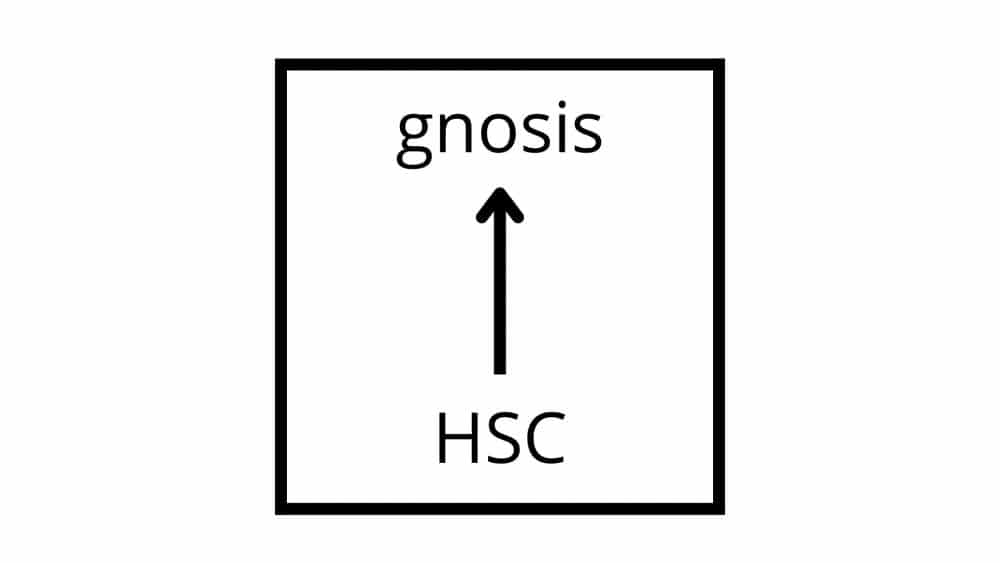
Fig. 1a
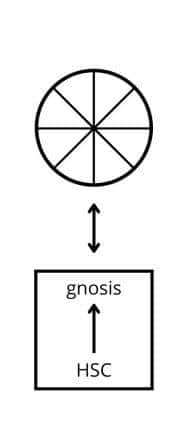
Fig. 1b
When this is set within a wisdom framing (Fig. 1c) (draws a bracket to the left of Fig. 1b and writes Wisdom Framing) so that comprehensively that person is developing interlocking sets of virtues for addressing self-deception and for affording self-optimization and this results in a reliable response of amelioration and alleviation of the perennial problems (draws an arrow to the right of Fig. 1b and writes Reliable response amelioration and alleviation of the PP), I would say that's enlightenment, at least enlightenment that I'm trying to reverse engineer. The components can each ultimately be explained and understood by our best cognitive science, I believe— at least I've given you reason that we can rationally hope that. What, of course, needs to be done is to still try and articulate (underlines wisdom) wisdom from a scientific perspective. And, of course, that is one of the most exciting things that's happening right now. Something that I am privileged to participate in— all of the ongoing scientific work with a psychological, cognitive scientific, and even neuroscientific work on what does wisdom mean and how can we cultivate it? And there's just so many people, and we're going to talk about that at length.
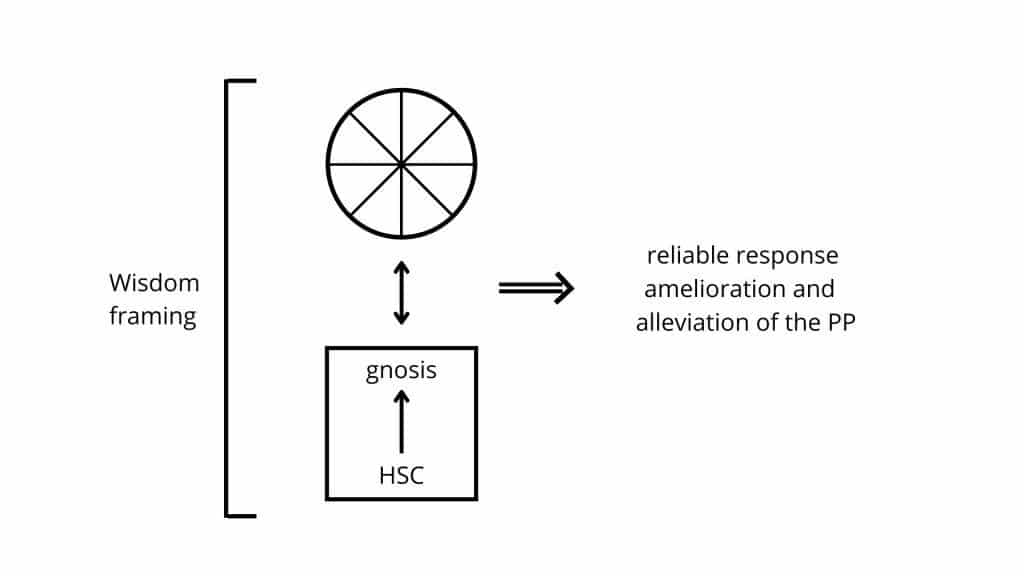 Fig. 1c
Fig. 1c
But we need to do something else, because we need to talk about the way in which this whole project, as I said, can be delegitimized, undermined, eroded if these whole sets of practices can't be situated within a encompassing and welcoming worldview. So having a ecology of psychotechnologies for addressing the perennial problems is necessary, but, of course, not sufficient for responding to the meaning crisis.
I've been encouraged by meeting so many people that are trying to set up—I'm trying to—I keep worrying— I want my language to be responsive to the creativity of these individuals who are trying to create these ecologies of psychotechnologies. I've talked to Rafe Kelley, for example. He's done some amazing work on trying to bring together aspects of parkour, the martial arts people doing something like the circling practice and again, create this ecology of practices. Talking to Michael Nathan, and he's trying to integrate ideas about the training and cultivation of wisdom into the training of martial arts in order again, to try and realize an ecology of practices for responding to the meaning crisis. And so there's many people out there already doing this. So I want to indicate that I'm pointing to something that people are already doing. I'm not trying to take credit for it, but I'm hoping that I'd be getting some supportive feedback though— that the work I'm doing here with you, of trying to articulate that, can help facilitate these groups and help them coordinate and communicate and potentially commune with each other in a mutually beneficial fashion.
So a couple more things. We need to go back to this (indicates Wisdom framing in Fig. 1c). We need to talk about the integration with the historical forces, because there's a particular issue that comes to the fore. (Erases the board) So this is the plan for going forward. Let's talk about the interaction between the historical forces and the perennial problems. And let's talk about, more explicitly, can we respond to the loss of the three orders and the worldview misattunement?
And then what that would look like—and again, I'm not proposing to found—I'm trying to just talk about what I see emerging and hopefully give some suggestive steps towards: can we get that religion that's not a religion? And then, put that into dialogue with other people who have engaged in similar project, people like Tillich and Jung and Corbin and Barfield. And so that we've got at least, I hope, a very rich dialogue with a lot of momentum to it for trying to get to this religion that's not a religion. Okay.
Interaction Between Historical Forces and Perennial Problems
So the historical forces, the loss of the three orders; let's remember this (Fig. 2a) (writes Historical forces) and why it matters. So you've lost the three orders you've, we've lost the nomological and the nomological basically gives us this deep sense of coherence (writes -nomological-coherence) and connectedness (writes connectedness below coherence) that is so central. We know from our current work on meaning in life. We lost the normative order (writes normative-significance), which gives us, I would argue, that sense of significance, depth (writes depth below significance) that we get through self-transcendence. And of course we've lost the narrative order, which gives us a sense of purpose or direction (writes narrative-purpose). And then, as we've lost this (Fig. 2a), we have a worldview again, in which we don't belong and in which our projects don't belong, et cetera. And, of course, that will interact with (Fig. 2b) (draws a double-headed arrow to the right of Historical Forces)—It will exacerbate any attempts that individuals or groups have in addressing perennial problems (writes Perennial problems). And when you get that (indicates Historical forces and Perennial Problems in Fig. 2b) going, that's when the meaning crisis really bites you individually. It really gnaws at you as a person or as a community or as a group.
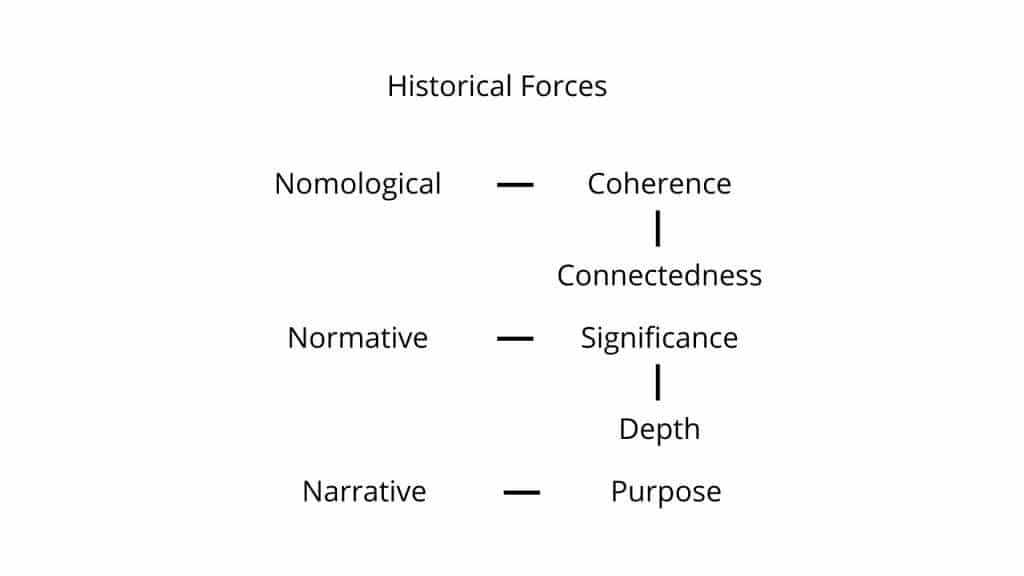
Fig. 2a
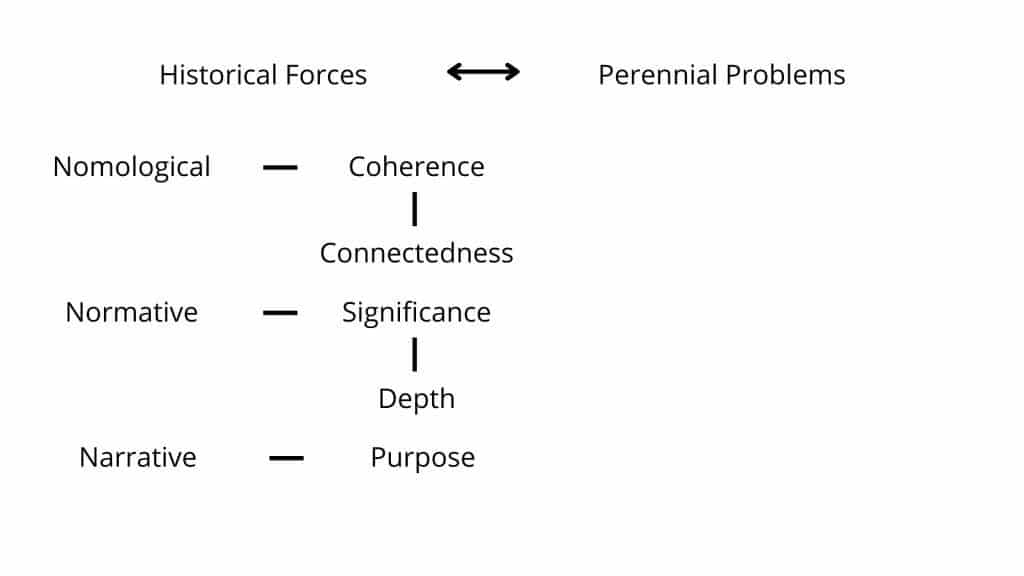 Fig. 2b
Fig. 2b
Now, I want to talk about, first of all, this interaction (indicates the area beside Connectedness and Significance) , because it brings up a particular problem. And here again, I'm going to point to the seminal work of Wolf (writes Wolf) on her book on Meaning in Life and Why It Matters. So I was interviewed by Leandro on a podcast: Manifested Wellbeing, and then he, he then later, recently interviewed, Wolf and her work on Meaning in life. So I recommend you going to that to take a look at her work, also reading her book. If you remember, she says that meaning in life is ultimately about a kind of deep connectedness that we want. So we have all these metaphors we want to be, we want to be connected to something larger than ourselves, bigger than ourselves, et cetera. And that's what makes our life meaningful. And of course, it's this notion of connectedness of which she says those are metaphors. They're what I would call their symbolic expressions of what people are really saying is—they want this.
She talks about it this way and think about how this just seems to everything we've been doing here. We want subjective attraction (writes Subjective attraction) to find salience and to be drawn into. We want subjective attraction to, that meets to, that connects with, that conforms to objective attractiveness (writes = Objective attractiveness to the right of Subjective attraction). So notice here (Fig. 2c) (indicates Subjective attraction = Objective attractiveness), but, of course, the transjectivity here—that it's actually in here (indicates =), that the meaning is to be found and notice also the connectivity and how much of this is, you know, the relevance realizing, the deep connection, the deep caring, the deep involvement, the deep participation.
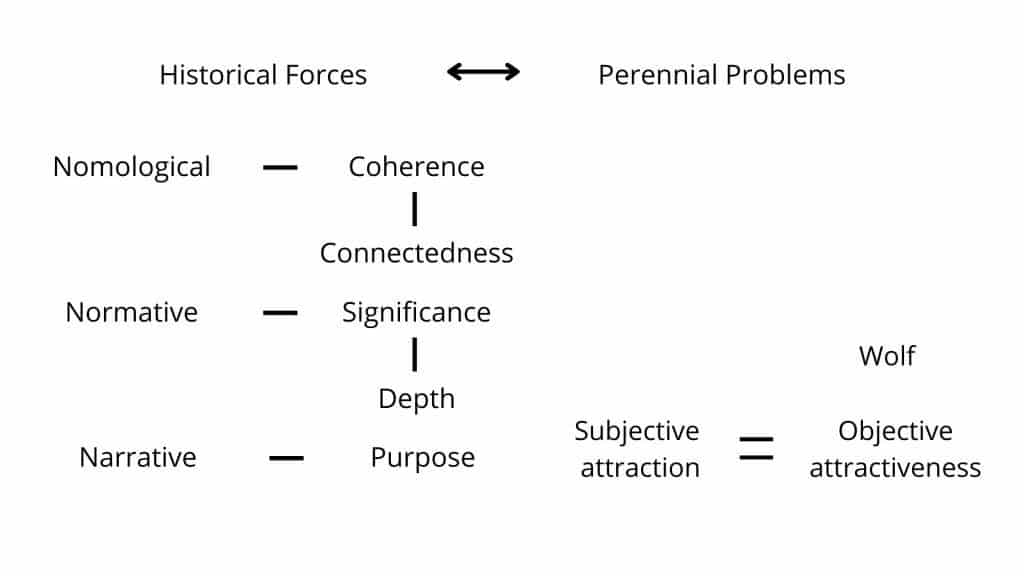 Fig. 2c
Fig. 2c
Okay, so that all winds up. But then, of course, and here's where this (taps Historical Forces) and this interact (taps Perennial problems), right? What happens is she says, "Ah, because of this (indicates Historical Forces), we know (creates an arrow from below Purpose to objective attractiveness) there's no such thing as this (crosses out Objective attractiveness)." (Fig 2d) We know there's no such thing as this. The scientific revolution of loss. There's nothing that is objectively attractive. This is a particular grammar, right? This is the grammar again. You know—there isn't an—there's nothing, there's nothing—there's no meaning or relevance in this thing (holds up the whiteboard eraser) in itself. This is ultimately a sort of a Kantian argument. And Wolf sort of leaves it there. She does allude to ways in which we can bullshit ourselves. We can pretend we have objective attraction just by finding a group of people who agree to value the same things we do. And that is a kind of bullshitting, because the salience of the group is actually masking whether or not it's given us what we're looking for. And she criticizes all of those attempts— I think quite rightly. And that's where she sort of leaves it, at least when I read the book. I don't know if more recent work she's got an answer to it.
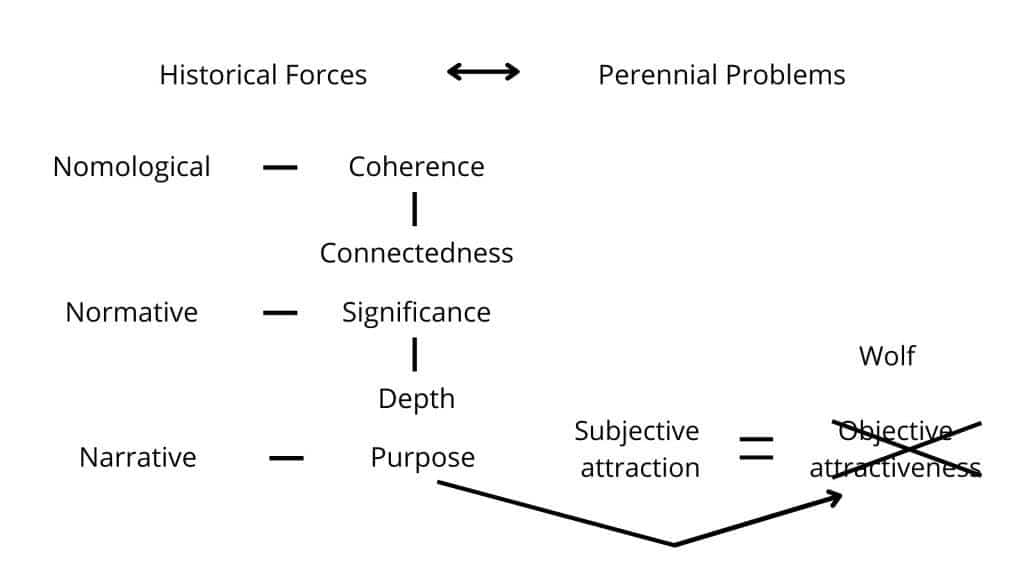
Fig. 2d
So work I'm doing with Thalia Vrantsidis, Juensung Kim, Phillip Riswick: we're really trying to say, is there a way addressing this problem (indicates the crossed out Objective attractiveness) using the current cognitive science, cognitive psychology, neuroscience, et cetera. I won't keep saying everything that's in cognitive science, you know, philosophy, psychology, neuroscience, machine learning. Can we use all of that— the best of that to address (indicates Subjective attraction = Objective attractiveness) this issue. So notice that again, this issue (indicates Subjective attraction = Objective attractiveness) is an issue in which historical forces (indicates Historical forces) prevent sort of the fundamental legitimation of the whole project that we would try to use (indicates Perennial problems) to address the perennial problems.
Cultivating, Realizing, and Appreciating Agape
Okay. So what can we think about this? Well, part of it is, I think, to ask is do we need things to be objectively valuable? So what that means is that things would have a value independent about how I would value them or how you would value them. And there is a particular move that you can make that doesn't require that the thing has objective value, right? Instead, you could think about: the set of characteristics that need to exist in order for meaning to be created. So what I'm trying to point you towards— we have to go very delicately, right?—I'm trying to point you towards that it's actually the transjectivity of the relationship (encircles =) that we need, and we don't really need objective attractiveness. (encircles attractiveness) That's not quite right.
So let's think about this: relevance realization is inherently interested in itself because, as I've argued, that's constitutive of it being a self-organizing, self-correcting, self-optimizing, self-developing, evolving process. Relevance realization is not something in me. It's not something in the world. It emerges in the affordances that are co-created by the world in myself. It's bi-directional in that fashion. So what I need to be connected to, I would argue, is I need to be connected to finding— I need to be connected to those conditions that afford relevance realization itself. Those conditions that satisfy my inherent valuing of the relevance realization process itself. So what does that mean? What that means is, I ultimately want to care about the conditions that afford meaning making itself. Those conditions, right, are universal in a sense, not in the sense that they are the same environmental conditions or the same psychological, but the same set of conditions that make possible and afford meaning making itself.
And this sounds all very abstract. And now I want to try and turn it around. And this is something that I'm arguing for: that when we care to create the conditions of meaning making— because we find them inherently valuable, because that is constitutive of our capacity to be agents and to value anything else— when we're doing that, what we're actually engaging in is agape.
Agape is to love for its own sake. The process of meaning making and the process of meaning making is the process of being a person ultimately. This is agape. That's why, of course, the things that contribute most significantly to meaning in life is our sense of being connected to other people agapically. What I'm saying to you is that there is a way of responding to this (Fig. 2e) (writes agape with an arrow pointing to Wolf), which is the cultivation, the realization, the appreciation of agape.
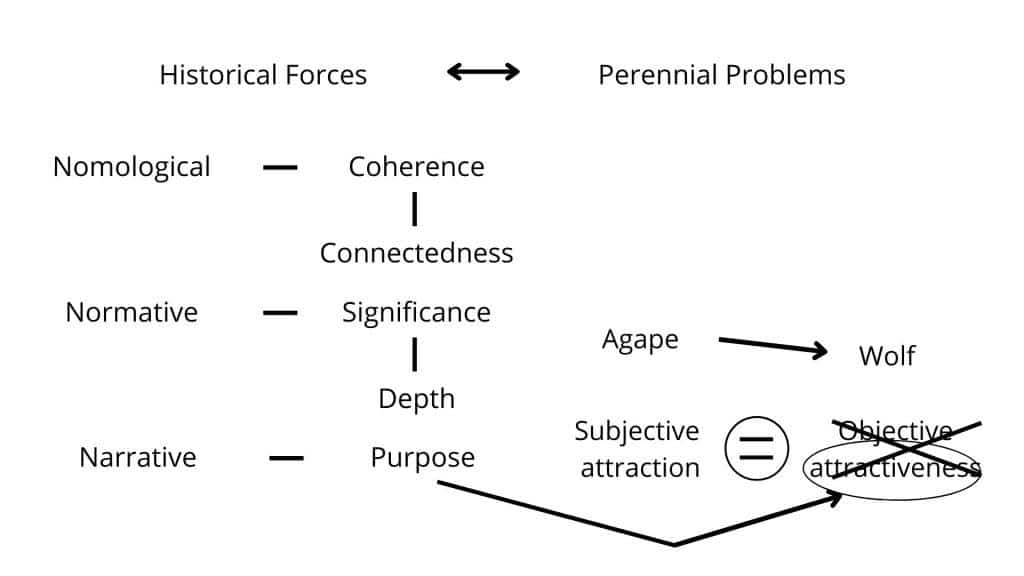 Fig. 2e
Fig. 2e
And you say, "But there's no objective value to meaning making." Of course there isn't, but it's not subjective or arbitrary. It is transjective, and it is in that sense, transcendental in a Kantian sense. It is— what I'm involved with are the very conditions on the possibility of meaning making itself. So to agapically love people, of course, it's not just to be directed at that body and mind it's to be directed at their conditions, their community, their environment, their development, their education. That's agape—that exists independently of me, of you, of us, of a group, because agape proceeds, permeates, and follows us.
So part of what it means, therefore—and this, of course, this is also part of the tradition, but it becomes especially pertinent for us— part of how enlightenment has to be for us is that whatever machinery (Fig. 2f) (encircles perennial problems) we craft together for addressing the perennial problems has to be integrated (draws a double-headed arrow between agape and perennial problems), grounded in an agapic way of being. And then that of course makes sense, too, if you think about being within the being mode, having an I Thou relationship, et cetera. We have to care about the conditions that make any caring possible. Part of what we need to do is to address this issue (indicates Objective attractiveness) with agape (indicates agape). The cultivation of agape. (erases the right half of the board) I think we should ultimately see agape as our deepest appreciation for the caring that is intrinsic, constitutive to the relevance realization that makes both the agent and the arena possible.
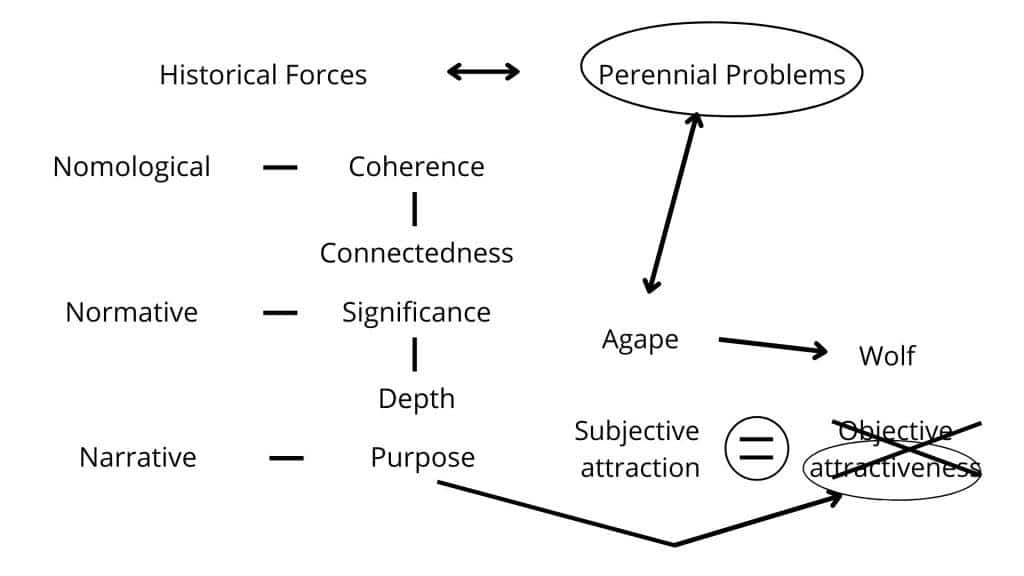 Fig. 2f
Fig. 2f
Is that pointing to something in the physics of reality? No, but it is pointing something. Is it therefore just pointing to something that's romantically dwelling within my subjectivity? No. It's pointing to caring about something that is inherently transjective and has a value independent of my valuing of it, because my valuing of it does not constitute it into existence. I emerge from it and participate in it. I am not the source or maker of it.
4E Cognitive Science: Embodiment, Embeddedness, Enactive, Extended
What about the historical factors? The historical forces? So we've lost the three orders. (erases Historical factors) We can, I would argue, we can make use of what's happening in third generation cog sci, 4E cog sci in conjunction with the theoretical machinery we've been developing on the cognitive scientific side of things to address that.
The way I want to do this, is I want to make use of an article by Francisco Varela (writes Varela). This is not me saying that I think that everything that Varela has to say, or all of his particular theories are right or something like that. But Varella is one of the founding figures of a third generation 4E cognitive science. Of course, that work has been developed significantly since him. And that's why it's important to only see him as a founding figure, not as the final figure. The seminal work of Evan Thompson. If you want to see this, these ideas taken into a depth, get Evan's book, Mind in Life. It's just [a] fantastic book. We talked about this: the deep continuity hypothesis and how it really situates us into an order because there's a continuity between the principles of cognition and the principles of biology, and then the principles of dynamical self-organizing physical system. Okay, but I want to pick up on this because I want to pick up on something that he said, because he writes this piece and it's simultaneously argumentative and autobiographical. And he wrote it in 2000. It's in a book called, The Psychology of Awakening and he talks about steps towards a science of interbeing: unfolding the Dharma implicit in cognitive science. So he relates the following thing: he was trying to, he had been asked to write an article about sort of —and around 2000 is when third generation cog sci was really starting to develop it. And he was asked to write an article: what are the main insights or claims about this? And I want to go through that and sort of unpack them a bit and then also unpack the elements. So, sort of what are the insights of third generation cog sci (writes - 3rd Gen below Varela) and I have been trying to exemplify them for you. I've been trying to exemplify them in all of the lectures throughout the whole of the series, but especially since episode 25, third generation cog sci (writes Cog sci) and unpack the 4E's (Fig. 3a) (Writes 4E below 3rd Gen cog sci)—I actually think there's sort of 5E's, but that's also called 5E cognitive science.

Fig. 3a
And how does it address (indicates Nomological, Normative, Narrative in Fig. 2a) the three orders? (erases the left side of the board) He says as he was doing this, what kept happening to him is he kept— as he kept articulating to himself the insights that were central to cognitive science, he found that he was constantly saying things that he found consonant with the Dharma, the central teachings of Buddhism. So he found this deep resonance between the science and a particular path about— whereby individuals and communities actually cultivate meaning, wisdom, et cetera.
So he listed the first one, and this is one of the 4E's of cognitive science, the issue of embodiment (writes Embodiment) (Fig. 3a). That we're deeply embodied. We're deeply embodied. So here's a quote from that 2001—oh sorry, that 2000 article, "Mind is not programmed software or rule-bound manipulation of symbols." He means symbols in the mathematical sense, not in the spiritual sense that we've been developing here. "Mind is not programmed software or rule-bound manipulation of symbols. Instead, the mind arises through immediate coping with the world." Okay. So the idea here is that we understand intelligence—and this is something I've been trying to articulate, right?— we understand intelligence as our coping with the world, the way we are evolving the sensory motor loop, right? So that we deal with what—we deal with the problems at hand that directly afford our interaction with the world at large.
So he uses the word 'coping' because he's trying to get us out of a fascination and a fixation with our capacity for theorizing. Not because he thinks that theorizing is wrong or that would— because that would be a self-contradictory act; he's offering a theory. But he's trying to say that we have to— he's trying to get us to remember the other kinds of knowing and the way in which, ultimately, to be a general problem solver, to be an intelligent cognitive agent is to have this ongoing, evolving fittedness to coping with my immediate interactions with the world. And that this is the defining features, he would argue—and I would agree with—being a cognitive agent. And he calls that embodiment. Many people might see that— Evan Thompson— as enactment, right?
So there's a bunch of these E's here (Fig. 3b). There's embodiment (writes Embodiment below 4E). Other people might say what Varela is talking about there is embeddedness (writes Embeddedness below Embodiment), the way we are embedded. Enactive (writes Enactive below Embeddedness). This is Evan Thompson's idea. That cognition is an inherently something we enact, right? Extended (writes Extended below Enactive). That our cognition is not in our head, but it's extended through our interactions, through the world, through our psychotechnologies, through distributed cognition. So those are the 4E's.
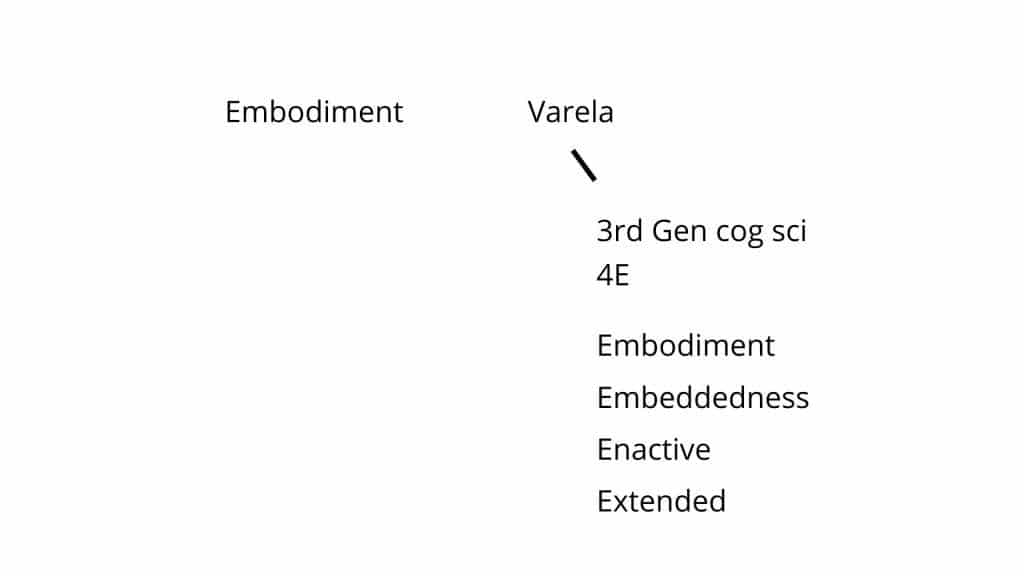 Fig. 3b
Fig. 3b
Deep Continuity In Embeddedness And Enactive Processing
Whether or not we should pin this (indicated the word Embodiment on the left) specifically to this (indicates Embodiment on the right), or maybe it overlaps with some of these other ones (indicates Embeddedness, Enactive, Extended). That's fine. We're going to see more of this with Varela anyways, but notice what this is about, the embodiment is about the idea that there is a deep continuity between your most abstract cognitive abilities and your most, well, embodied sensory motor action. I've tried to argue that you can see this in the following way: that your cognitive—your cognition (writes Cognition) is ultimately depended on, grounded in the relevance realization (writes RR and draws an arrow pointing down from Cognition to RR) and the relevance realization is ultimately grounded in(draws a downward arrow from RR) your bioeconomy (writes Bioeconomy below the arrow) (Fig. 4a). Your body is not some clay that you drag around in a Cartesian fashion. Your body is a bioeconomy that enacts logistical norms of efficiency and resiliency that constrain (indicates RR) your cognition so that it continually evolves its fittedness to the world. There's a deep continuity between cognition and biology. And, of course, the biology is deeply embedded. You are engaging in what biologists talk about as continual niche construction (writes Niche construction).
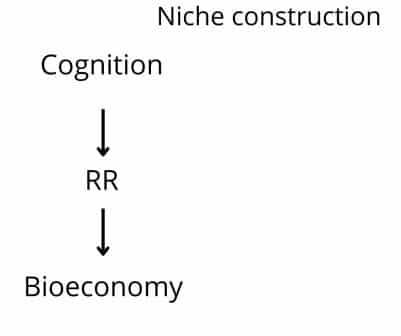
Fig. 4a
So the new biology that's emerging. I'm privileged to know and I get to interact with Dennis Walsh here at the University of Toronto. If you want to see some people that are doing the cutting edge work on the philosophy of biology, take a look at Dennis's work and the work of other people. There's an anthology— I think— I'm trying to remember what it's called. I think it's criticizing or reflecting on the grand synthesis, the synthesis between Darwinian evolution and Mendelian genetics. I'll get the right book panel to come up—but there is this idea about the importance of processes, like niche construction for understanding evolution and the idea here is, right—and you see how I've been making use of this (writes Organism Environment). There's the organism and the environment, right? And the idea is the organism is (draws an arrow from Organism to Environment) shaping the environment, shaping and selecting the environment, and the environment is shaping and selecting the organism (Fig. 5). And so, the organisms get involved with affecting the environments so that it is conducive to their way of being, but they also evolve both biologically and behaviorally, right, to exploit and make good use of that changed environment. And you've got this transjective evolving loop going on— niche construction.
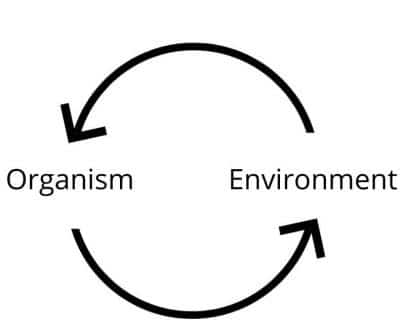
Fig. 5
We do this, of course, on a broad scale through culture, because what culture is we do this thing where we massively shape the environment and then massively shape ourselves to fit that environment, right? So culture is about both fitting people to an environment and fitting the environment to the people in this ongoing fashion. And so (erases Fig. 5) that takes us right into this notion, of course, that we are deeply embedded (draws an arrow pointing to Embeddedness in Fig. 3b). We're deeply embedded. So embodiment leads to—and there are some people that argue that embeddedness sort of reduces to embodiment; Rowland seems to be arguing that in one of his books on, "The New Science of the Mind." But anyways, the idea here is the deep continuity. We are deeply embodied; we are deeply embedded.
Now notice how that is going—it's undermining the way in which Descartes severed everything, right? And if—so this (Fig. 4b) (draws an arrow from Niche construction to RR in Fig. 4a) is obviously a species of niche construction, the comprehensive one—and if this (draws an arrow away from RR and writes Consciousness), as I've tried to argue, can even tell us something important about consciousness, both its function and its phenomenology, then we can seriously respond to Descartes and say, "No, no. The mind and body are not disconnected." They are in a deep continuity and the mind and the world are not disconnected. They are in a deep continuity of embeddedness and enactive processing. (erases Fig. 4b)
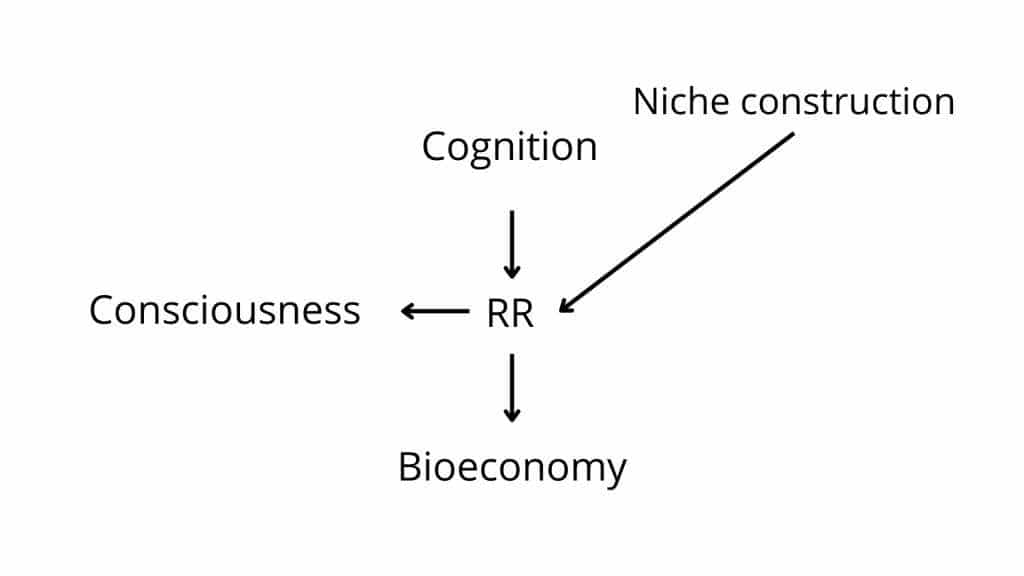 Fig. 4b
Fig. 4b
The Emergence Of The Mind
So. What's the second insight that Varela brings up? Emergence (writes Emergence), which is a major term now. And this is something that has been invoked throughout the series, the idea that a system—the system, especially the system itself—organizing, it can produce properties as a system that the component parts can't possess. And so the idea is the mind in this sense, it emerges (underlines Emergence) out of the embodied, embedded brain coupled to a living environment, right? I tried to give you ways of understanding that emergence and how it is reflected in your spirituality by your capacity for self-transcendence and how that could be understood, at least in part, a significant part, by the complexification (draws an arrow from Emergence) that is inherent in your relevance realization machinery (Fig. 6) (writes Complexification - RR) in your religio.
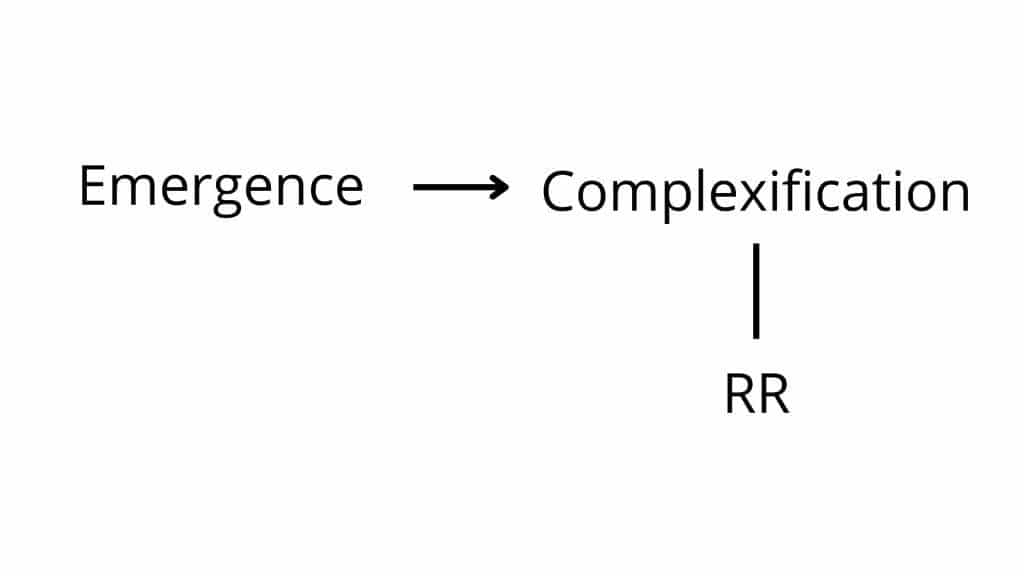 Fig. 6
Fig. 6
So what does this mean for us? This means that we are starting to get something like a vertical dimension back to our ontology, not a two worlds vertical dimension, but the idea of emergence through complexification of things like biology—so you've got self-organizing things (Fig. 7) (writes Self-organizing) and they already—so what processes, like—the processes of combustion is self-organizing. A tornado is self-organizing, erosion is self-organizing, evolution (writes Evolution beside Self-organizing) is self-organizing. And the thing is particular kinds of self organization, like evolution could produce (draws an arrow away from Self-organizing) things that are more than self-organizing. They are self-making (writes Self-Making - Auto-poietic above Self-organization). This is Varela's notion of auto-poietic system.
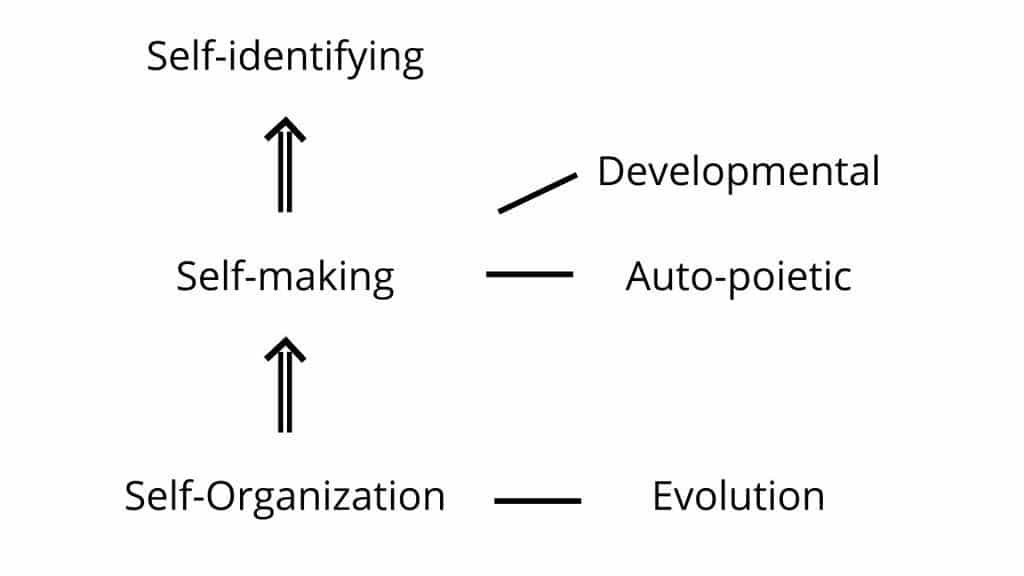 Fig. 7
Fig. 7
There's lots of controversies around this and I don't think (erases Fig. 6) it solves everything that Varela thinks it solves, but it is definitely the case that unlike a tornado, I am a self-organizing thing that self-organizes such that I seek out those conditions that protect and promote my agency, right? And then, of course, the self-making things (draws an arrow away from Self-making), they can become more than just self-making things. They can become self-identifying things (writes Self-identifying above Self-making). You can become a reflective self-making thing. You can become aware of, come to some understanding and appreciation of yourself making, of the way in which you are inherently developmental (writes Developmental connected to Self-making), because that's what we're talking about when we talk about development, the way in which you're self-making. And then you can (indicates Self-identifying) interact with that in ways that I've tried to show to you and so on and so forth. And so self-transcendence—and notice what's happening here: a normative order is being given a metaphysical backing.
Now I want to come back later towards the end of this series and talk about this bottom-up emergence and does it need to be complemented by a metaphysical idea of a top down emanation? And what might that mean? I'm going to be very tentative about that because this is something that is really trying to break free from some of the deepest grammar that has gotten us into the meaning crisis.
Emotions Bring Relevance Realization Into Your Salience Landscaping
But right now, I'm going to continue with Varela. Okay. So you've definitely got emergence. What's the third one? So there's all these E's (Indicates Fig. 3b). So he's got, you know, embodiment (writes Embodiment), which is shared with 4E cognitive science. And I think whatever you think about some of his claims about autopoiesis and others, he helped to really bring this (indicates Embodiment) to the fore for cognitive science. And this is now informing experimental psychology. We're seeing how much your embodiment affects your cognition, right? And then he gave the next one—was emergence (writes Emergence). And then the third one is emotion (Fig. 3c) (writes Emotion).
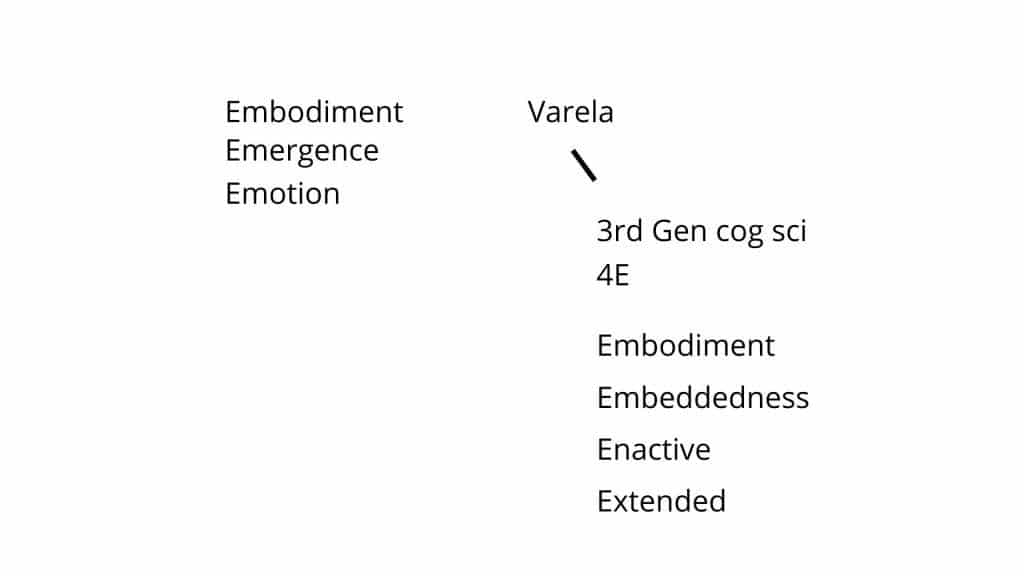 Fig. 3c
Fig. 3c
This is really interesting because the deep divide between emotion and reason, a divide that I think is enshrined, ossified in our cognitive grammar, cognitive cultural grammar, and the ongoing battle between the empiricists and the romantics between John Locke and Rousseau is being addressed. And we went back to this and so we can think of the work of Damasio (writes Damasio) here in Descartes' Error and we've talked about this and now you see this (indicates Damasio), right? Damasio is basically showing that people without emotion, even though all of the calculative machinery may be operating normally/well means these people that—you remember in Descartes' Error, —that although all the calculative machinery is operating well, they're disconnected from their emotions. They are incapacitated as cognitive agents. Why? Because without emotion, without the caring that is integral (writes Caring below Damasio) to relevance realization (writes RR below Caring). Remember what Reed said that we're different from communities and computers that we have to care about emotion? And why do we—so we have to care about information. Why do we have to care about information? Because we ultimately have to take care of ourselves (writes an arrow from Caring and writes Take care) because of the kind of beings we are (Fig. 8) (draws an arrow from Take care to Auto-poietic), right? When you don't have that (indicates Caring), you face combinatorial explosion (writes C.E beside Damasio).
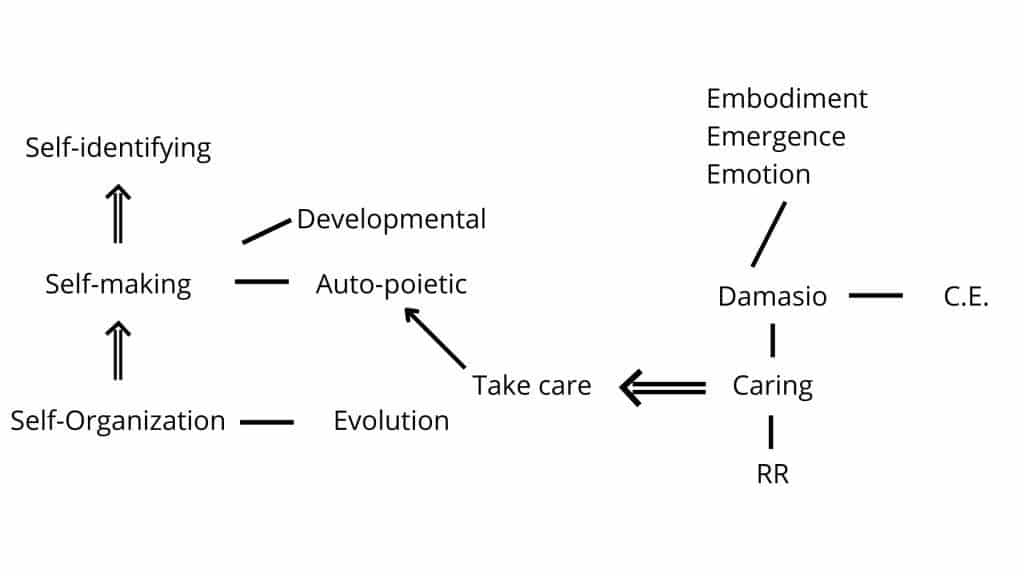 Fig. 8
Fig. 8
There's a deep interconnection between being embodied, being a relevance realizer and having emotions. Emotions is the way in which relevance realization is brought up into the level of your salience landscaping. And what emotions do is they craft your—they shape and sculpt the salience landscaping, such that an agent arena relationship becomes obvious and apparent to you. When you are angry, you assume a particular role. You assign a bunch of identities and it's obvious to you what you should be doing. I would make this prediction: that as we move towards making—and we're going to come back to this issue about artificial general intelligence—as we moved towards making artificial general intelligence, we more and more—we're already having to give these machines something deeply analogous to attention, and we're going to, I would predict, have to give them something analogous to emotion (erases half of the board).
So I think it's better to talk about this. I would put the two together, right? That within religio (writes Religio), you always have caring/coping (Fig. 9) (writes Caring - Coping below Religio). Caring/coping. And that's the core of your cognitive agency. The emotion also carries up to the relationship and of course, this goes back to agape. That emotion is how we coordinate the attachment— I don't mean it in the Buddhist sense. I mean, in the psychological sense—the attachment relationships between individuals, such that we create persons. That we create persons who are capable of dwelling within and coordinating their efforts within distributed cognition. We create persons within communities of persons that shape themselves, their community, and their world to fit together in an ongoing agent arena fashion.
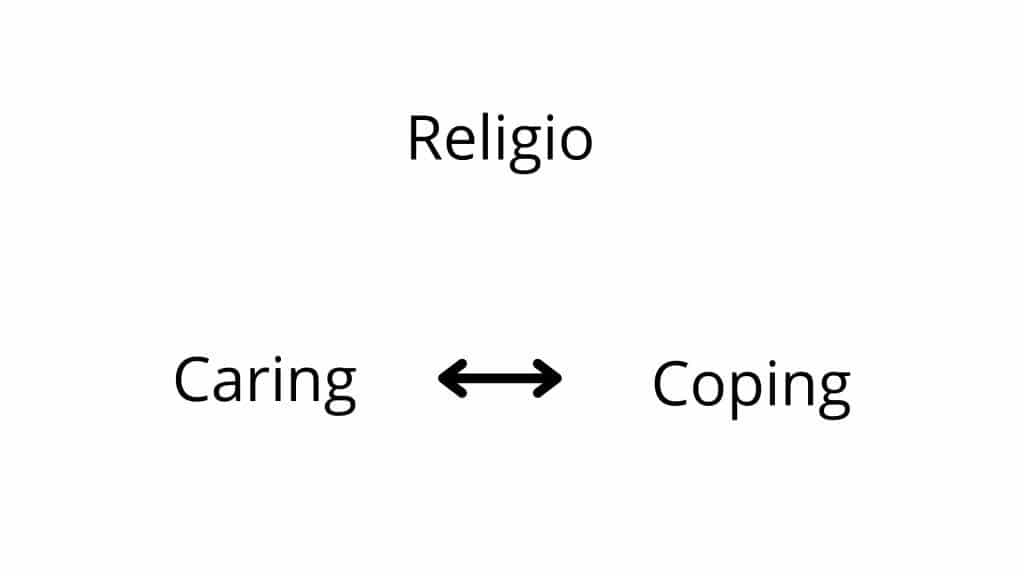
Fig. 9
Wisdom Helps Cultivate Responses To Perennial Problems Through The Use Of Cognitive Science
The last it points to is a kind of excellence (Fig. 3d) (writes Excellence below Emotion in . This has to do with connections between third generation 4E cognitive science, dynamical systems, self-optimization, and an aspect of psychology that has become known as positive psychology (writes Positive Psychology).
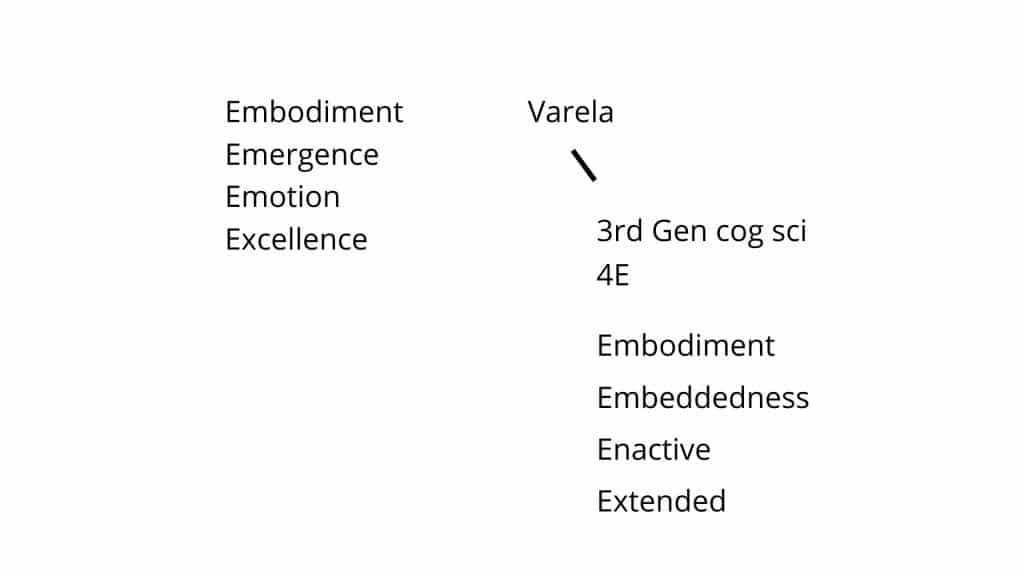 Fig. 3d
Fig. 3d
Positive psychology is a way of doing psychology that is complementary to our standard way. Our standard way of doing psychology is to see how things break down, how they fall apart. And there's two—and I'm not trying—I am not—I believe most people in positive psychology are also not trying to dismiss or debunk or any crazy thing like that sort of standard psychology, because standard, psychology studies the mind by how it breaks down for two very good reasons. One is by studying how it breaks down, we can analyze it and we can thereby understand its part and how they might be working together. And also by understanding how the mind breaks down, how the psyche breaks down, we can potentially therapeutically and pedagogically intervene to fix it. Repair it. Therapeutic intervention. Therapeutic and pedagogical intervention. So that's very noble and I'm not trying to, I'm not trying to diss that in any way, but what positive psychology says is you shouldn't study the mind only in terms of how it breaks down. You should also study the mind in terms of how it excels beyond the norm (Fig. 10a) (draws an arrow from Positive Psychology pointing down to Excels beyond the norm).
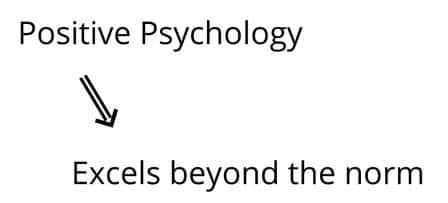
Fig. 10a
How do all the pieces fit together in a way—see, your brain is a machine of machines that can make itself into a new kind of machine. How can the brain put—how does the brain—the embodied, enactive, embedded brain, body, sensory motor loop, mind—how does it transcend itself? How does it excel? We should study individuals who have optimized their cognition better than the norm. Because here's the idea: very often, you can only understand something deeply, not only in terms of its parts and how it breaks down, but you can only understand in terms of the whole and how it excels because that reveals properties and powers that you don't see in the norm.
So positive psychology studies things like, happiness, meaning in life, importantly—and this is where 4E cog sci (indicates 4E cog sci) and positive psychology really come together (draws an arrow from Excels beyond the norm and another arrow from 4E cog sci): Wisdom (Fig. 10b) (writes Wisdom). Wisdom is the term we give for people who have, or who are excellent in their cognitive capacities for coping and caring. And for, I would argue, responding to issues of self-deception, helping people deal with the perennial problems of human existence. And so this becomes a topic—a topic to which we are going to shortly turn, because as I argued in the end, we need an account of wisdom, both for cultivating [a response to] the perennial problems and also for how to make the best use of this science. It's one thing to have the knowledge that's coming from this science, but we need the wisdom of how to use it best, how to understand it and use it best (erases the board).
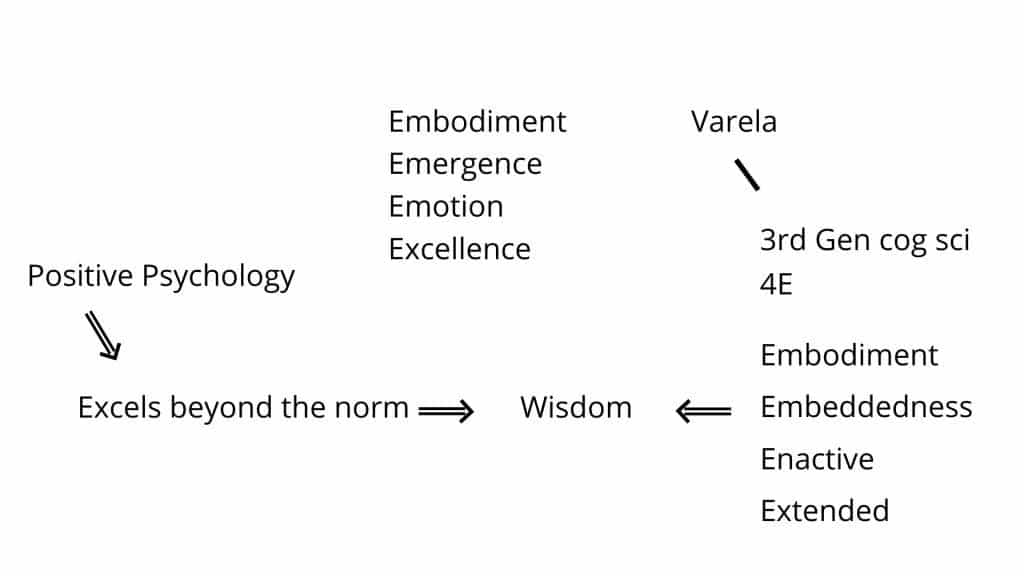 Fig. 10b
Fig. 10b
The deep continuity and emergence and development: they give us back our nomological order. We see how we fit in, how we belong and we see how our meaning making belongs/fits in. We see a normative order. We see what it is to self-transcend. We have to do more on this, especially with the topic of wisdom, but how it is we can cultivate enlightenment, how it is we can respond to the perennial problems. How it is that we can bring about the best internal optimization, the best external reciprocal realization, how we can afford anagoge.
I think this brings with us—brings with it an important point (writes Transcendence). This is the work of Goodenough (writes Goodenough to the upper right of Transcendence), which is a perfect name and her work on The Sacred Depths of Nature. And she talks about how as a scientist, and she's trying to recover that sacred depths of nature, sacredness, awe, and wonder in a way that helps her cultivate wisdom. And of course, transcendence is integral to this and she talks about that and you can see what she's doing. She's trying to challenge the fundamental grammar that we've inherited from the Axial Age. She talks about a new sense of transcendence. Instead of transcendence above (writes Above beside Transcendence)—which of course invokes the two worlds mythology—what she talks about is we need this new sense: transcendence into (Fig. 11) (writes Transcendence into below Transcendence). Transcendence into the depths of nature. Transcendence, I would also argue, and I don't see her as opposed to this. I see her enacting transcendence into the depths of the psyche and the two deeply integrated and coordinated together in reciprocal realization. Remember, the opposite of reciprocal narrowing, the reciprocal opening up the mutual disclosing, which is experienced as a kind of love transcendence into (encloses Transcendence into a box).
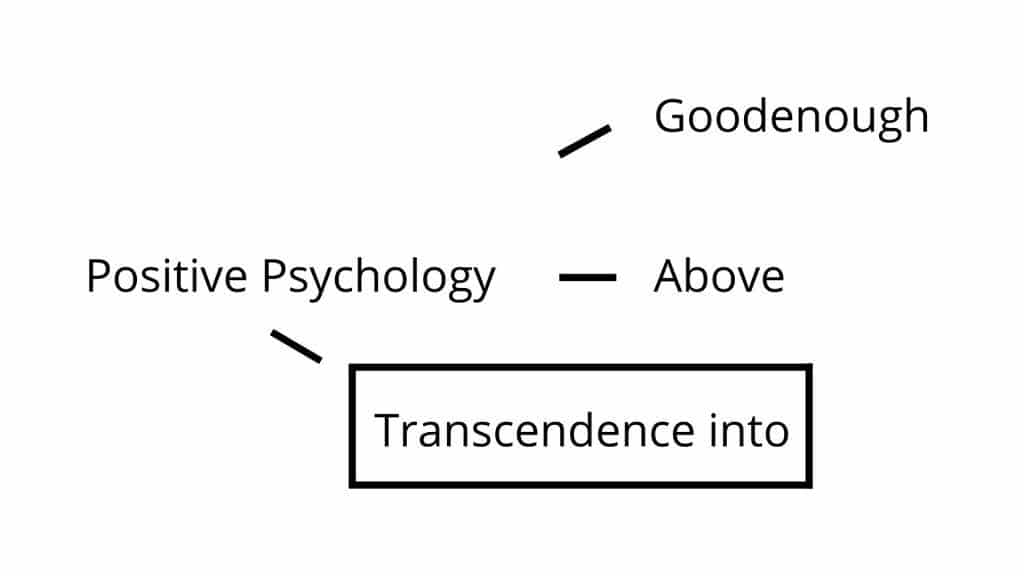 Fig. 11
Fig. 11
Moving To A Post-Narrative, Open-Ended Optimization
So the one that remains—the order that remains unconnected for us to this argument is the narrative order, because the narrative order points us towards a telos, a cosmic telos. And evolution and relevance realization are non-teleological. They're open-ended. So if we're looking to find something that will bring back the narrative order, in that sense, I don't think we can find it, but perhaps we should think differently about the narrative order. Perhaps we should think of the narrative order now as more to do with gnosis. We should think of it as an open-ended optimization, an open-ended optimization. And that we may have indispensable need for symbols and stories to afford that. But we do not need to think of those symbols and stories as existing independently in the structure of reality. We certainly don't want to get back to utopic visions or their antithesis in nostalgic visions because both of those have been the source of a lot of suffering and distress.
Is it possible, because you see this in Stoicism, you see this in Buddhism, you see this in Daoism, is it possible to move to a post-narrative way of being in which we are concerned not with our historical narrative, our horizontal identity, but we're concerned with the depths to which we are capable of living. That perhaps what we need is not a grand purpose, a narrative of a grand purpose that is connected with the history of the cosmos. Perhaps instead, we can move to getting beyond a narrative way of conforming to reality, to a post-narrative, the kind of experience people have in higher states of consciousness, where the narrative drops away. And nevertheless, they experience themselves as deeply connected, deeply at one with themselves and with reality, and that this seems to have given their life, these moments, a significance to it. And again, there's no mystery to these higher states of consc— because there is no theoretical mystery because there's a cognitive continuum from fluency to insight (writes Fluency - Insight). We're just exacting the machinery over and over again, to flow (writes Flow and draws an arrow from Insight to Flow), to mystical experiences (writes M.E. and draws an arrow from Flow to the M.E.), to mystical experiences that drive transformative development (writes H.S.C. and draws an arrow from M.E. to H.S.C), the higher states of consciousness (Fig. 12).
 Fig. 12
Fig. 12
We'll take a look at this proposal, drawing this all together, coming back to talking about the religion that is not a religion, to setting up the discourse with people like Tillich and Barfield and Jung and Corbin. And we also need to come back and take a look at the cognitive science of wisdom because all of this is being done within a wisdom framing. The wisdom that captures the excellence, which was the fourth insight of Varela.
Thank you very much for your time and attention.
Episode 38 Notes:
To keep this site running, we are an Amazon Associate where we earn from qualifying purchases
Rafe Kelley
Rafe Kelley is the founder of Evolve Move Play, a natural movement training for the body and mind. He advocates a culture of movement in the natural environment.
Paul Johannes Tillich
Paul Johannes Tillich was a German-American Christian existentialist philosopher and Lutheran Protestant theologian who is widely regarded as one of the most influential theologians of the twentieth century.
Carl Gustav Jung
Carl Gustav Jung was a Swiss psychiatrist and psychoanalyst who founded analytical psychology.
Henry Corbin
Henry Corbin was a philosopher, theologian, Iranologist and professor of Islamic Studies at the École pratique des hautes études in Paris, France.
Owen Barfield
Arthur Owen Barfield was a British philosopher, author, poet, critic, and member of the Inklings.
Susan Wolf
Susan Rose Wolf is an American moral philosopher and philosopher of action who is currently the Edna J. Koury Professor of Philosophy at the University of North Carolina at Chapel Hill.
Book Mentioned: Meaning In Life and Why If Matters - Buy Here
Manifested Wellbeing
Wellbeing and Nutrition coach providing content on health, mindset and nutrition.
Podcast Mentioned:
Meaning in Life and Wisdom | John Vervaeke: Listen Here
Meaning In Life and Why It Matters | Susan Wolf: Listen Here
Francisco Varela
Francisco Javier Varela García was a Chilean biologist, philosopher, cybernetician, and neuroscientist who, together with his mentor Humberto Maturana, is best known for introducing the concept of autopoiesis to biology, and for co-founding the Mind and Life Institute to promote dialog between science and Buddhism.
Book Mentioned: The Psychology of Awakening - Buy Here
Evan Thompson
Evan Thompson is a professor of philosophy at the University of British Columbia. He writes about cognitive science, phenomenology, the philosophy of mind, and cross-cultural philosophy, especially Buddhist philosophy in dialogue with Western philosophy of mind and cognitive science.
Book Mentioned: Mind In Life: Biology, Phenomenology, and the Sciences of Mind - Buy Here
Dennis Walsh
Book Mentioned: Challenging the Modern Synthesis: Adaptation, Development, and Inheritance - Buy Here
Mark Rowlands
Mark Rowlands is a Welsh writer and philosopher. He is Professor of Philosophy at the University of Miami, and the author of several books on the philosophy of mind, the moral status of non-human animals, and cultural criticism.
Book Mentioned: The New Science of the Mind: From Extended Mind to Embodied Phenomenology - Buy Here
Antonio Damasio
Antonio Damasio is a Portuguese-American neuroscientist.
Book Mentioned: Descartes’ Error: Emotion, Reason, and the Human Brain - Buy Here
Ursula Goodenough
Ursula W. Goodenough is a Professor of Biology Emerita Washington University in St. Louis where she engaged in research on eukaryotic algae.
Book Mentioned: The Sacred Depths of Nature - Buy Here
Other helpful resources about this episode:
Notes on Bevry
Additional Notes on Bevry


